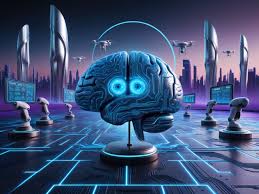
How AI is Shaping the Future of Work in 2024: Top Trends and Insights
Created on 12 November, 2024 • Technolgy • 0 views • 3 minutes read
Artificial Intelligence is no longer a futuristic concept—it’s reshaping industries across the globe in 2024
1. AI-Powered Automation: Boosting Productivity
One of the most significant shifts in the workplace is the rise of AI-driven automation. Tasks that once took hours—like data entry, scheduling, and email management—are now handled by intelligent systems. Tools like Zapier and UiPath are helping businesses automate workflows, freeing up time for employees to focus on more strategic tasks. The future of work will be defined by seamless automation that enhances productivity without compromising creativity or decision-making.
Example: AI chatbots are being used to handle customer service inquiries, while AI-based scheduling tools are taking over appointment management for HR departments and personal assistants.
---
2. AI as a Collaborative Tool: Augmenting Human Intelligence
Rather than replacing workers, AI is enhancing human capabilities. Collaborative AI tools are designed to work alongside human teams, amplifying their decision-making abilities. Software like ChatGPT helps with coding, generating reports, and drafting content, while AI-enhanced design tools like Canva enable teams to create professional graphics with ease.
Example: In marketing, AI can assist in generating personalized content for specific customer segments, while human creativity ensures that the brand’s voice remains intact.
---
3. The Rise of AI-Driven Data Analysis
Data is one of the most valuable assets in modern business, and AI is making it easier to harness its power. Platforms like Tableau and Power BI use AI to analyze vast amounts of data and present actionable insights. AI tools can now predict trends, automate reporting, and provide real-time decision support, giving businesses a competitive edge.
Example: AI can analyze customer data to predict future buying behaviors, helping businesses fine-tune their marketing strategies and inventory management.
---
4. AI and Remote Work: Enhancing Collaboration Across Distances
As remote work continues to rise, AI is playing a key role in improving virtual collaboration. Tools like Slack and Microsoft Teams are integrating AI-powered assistants to help manage tasks, streamline communication, and even schedule meetings. AI is also being used for virtual hiring, with platforms like HireVue analyzing candidates through AI-powered video interviews.
Example: AI can scan a resume and compare it against the job description, automatically flagging candidates who are the best fit, saving recruiters time and effort.
---
5. Ethical Considerations: Balancing AI and Human Jobs
As AI increasingly takes on more roles, there are growing concerns about its impact on employment. While some jobs will be displaced, others will evolve, with workers needed to manage AI tools, interpret data, and make ethical decisions. It’s crucial for businesses to strike a balance between using AI for efficiency and ensuring that they’re not compromising their workforce’s livelihoods.
Example: AI can automate factory jobs, but skilled workers will be needed to maintain and repair these automated systems. In healthcare, AI can assist in diagnostics, but doctors will still make the final decisions.
---
6. AI in Skill Development and Education
AI is also revolutionizing how we learn and upskill. Personalized learning platforms, like Duolingo and Coursera, are using AI to adapt courses based on an individual’s learning style and pace. AI is also being used in workforce training programs, helping employees stay competitive in an AI-driven job market.
Example: AI-powered tools like LinkedIn Learning suggest courses based on your career trajectory and skills gaps, enabling workers to upskill quickly.
---
Conclusion:
AI’s role in the workplace is expanding rapidly, making it essential for businesses and professionals to embrace these technological advancements. While AI has the potential to automate tasks and increase productivity, it’s also essential to recognize its ethical implications and its role in reshaping job functions. By staying ahead of these trends and using AI as a collaborative tool, the workforce of 2024 will be more efficient, data-driven, and innovative.
Popular posts
-
Coin Master free spins & coins daily links January 2023Games • 2,832 views
-
AI in Healthcare: Advancements and ChallengesTechnolgy • 1,630 views
-
7 Simple Steps to Rank Number 1 in Google SearchTechnolgy • 1,313 views
-
E-commerce EvolutionTechnolgy • 1,000 views
-